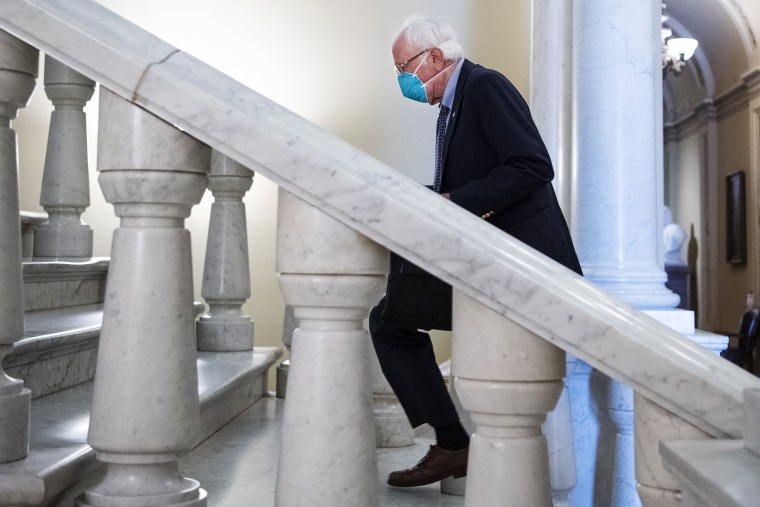WASHINGTON — Six senators led by Sen. Bernie Sanders, I-Vt., wrote a letter Tuesday demanding another round of $1,200 direct payments in a coronavirus relief package that a bipartisan group of lawmakers is trying to hammer out by next week.
"Please join us in demanding that any new COVID-relief proposal includes a $1,200 direct payment to adults and $500 to their children," read the letter, which was co-signed by Democrats Elizabeth Warren and Ed Markey of Massachusetts, Ron Wyden and Jeff Merkley of Oregon, and Kirsten Gillibrand of New York.
"We very much appreciate the hard work that has gone into the current $908 billion proposal being drafted by a number of Democratic and Republican Senators. But, simply stated, given the horrific extent of the current crisis and the desperation that working families all over this country are experiencing, this proposal does not go anywhere near far enough," they said.
The letter seeks to inject new pressure into bipartisan negotiations over the $908 billion coronavirus relief package that includes $300-per-week unemployment insurance and assistance to small businesses and states, among other provisions.
The current agreement would not include another round of direct payments, a popular provision in the Coronavirus Aid, Relief and Economic Security Act in March. Republican leaders have objected to the high cost — about $300 billion — and so negotiators have sought to keep the overall price tag under $1 trillion.
Among the signatories, Sanders has vowed to vote "no" unless the package includes direct payments, although his colleagues haven't gone that far.
It is unclear if Sanders and the other Democrats could sink a deal without another round of checks by withholding their support.
Sen. Josh Hawley, R-Mo., who supports direct payments and spoke to President Donald Trump about it, said he hasn’t "had any luck" finding Republicans who will vocally join him in pushing for another round of checks.
"The person who I've found most receptive to engage with this is the president. I talked to him Saturday night. We had a long conversation about it," he added.
Majority Whip John Thune, R-S.D., told reporters in the Capitol on Tuesday that stimulus checks aren’t a "part of the discussion at this point,” but “if something else falls out, this could fall in."
Sen. Mitt Romney, R-Utah, part of the coalition crafting the bipartisan relief framework, said "that’s not something that’s part of our proposal."
"It’s not in this framework, the $908 billion framework. I know there’s considerable public support for it but right now we’re targeting struggling families, failing businesses, health care workers and we don’t have a stimulus check to every single person, regardless of need," Sen. Susan Collins, R-Maine, said.
Sen. Joe Manchin, D-W.Va., said he's open to adding direct payments if his colleagues accept the cost.
Another point of contention in the talks is liability protections for businesses and organizations, a policy sought by Senate Majority Leader Mitch McConnell, R-Ky., and resisted by the Democrats who signed the letter.
"Further, please work with us to make certain that there is no language in this bill to give a liability shield to corporations who threaten the health and safety of workers and customers," the six senators wrote.
At his weekly press conference Tuesday, McConnell mentioned numerous policies that are part of the negotiations. He did not mention direct payments.
The Kentucky Republican defended the liability shield Tuesday as necessary to help the economy recover and ward off an epidemic of lawsuits. He said it's "not total immunity" and won't protect employers that are "grossly negligent."
McConnell signaled an endgame on Covid-19 relief if a deal isn't struck soon. He said "the two most contentious items" can be set aside, referring to the liability shield and state and local aid, and be revisited early next year.
"Leaving here without a Covid relief package cannot happen. We have to get that done," he said. "I think both sides fully understand that."


